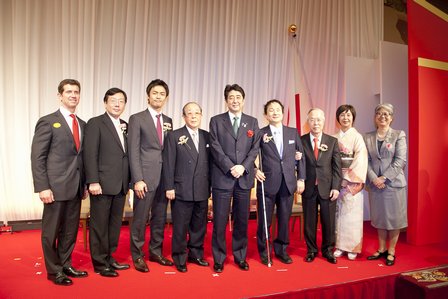- HOME
- NEWS
- RCAST Report
- Professor Satoshi Fukushima was awarded the 9th Healthy Society Award of the Japanese Nursing Association and the Johnson & Johnson Group.
Professor Satoshi Fukushima was awarded the 9th Healthy Society Award of the Japanese Nursing Association and the Johnson & Johnson Group.
- Award
March 19, 2013

Professor Satoshi Fukushima (barrier-free) received the ninth Healthy Society Award (Educator Division) on March 19, 2013. The award was founded by the Japanese Nursing Association and member companies of the Johnson & Johnson Group in Japan for the purpose of honoring people who play leading roles in various fields. Six recipients of the award, including Professor Fukushima, met His Imperial Highness the Crown Prince at the Togu Palace.
Accepting the Healthy Society Award
I am very honored to receive this award. Thank you.
I lost my vision when I was 9. The last vivid image I remember seeing was the pale orange color of the fruit of a loquat tree that was standing in early summer sunlight in the garden of the hospital where I was staying.
When I was 18 I lost my hearing. I think the last faint sound I heard was probably the voice of my friend desperately yelling ""Fukushima!"" into my ear.
In English, those who cannot see nor hear are referred to as ""deafblind people."" In Japanese, we say ""morosha."" The most famous morosha is probably Ms. Helen Keller. Very few others are well-known. In Japan, as far as we are aware there are about 20,000 deafblind people.
Since becoming a morosha, my most potent realization has been that my survival is dependent on the assistance of others. At the University of Tokyo, where I teach, I have put students through the simulated experience of being blind and deaf once or twice. They form pairs, with one person acting as a deafblind individual by wearing eye masks and headphones, and the other person acting as the first person's helper. They move around the classroom for about 30 minutes and try to communicate with each other without using their voices.
In the beginning, the students who take the deafblind role seem to be anxious, but eventually they do their best to exchange words with their partners.
After these sessions, many of the participants realize anew the importance of communication. They also admit to being greatly moved when they first felt the warmth of the hand of the person who guided them.
So what is a ""healthy society""? Is it a society where there are no ill people, where physicians are rendered unnecessary? I don't think that's what it means. Everyone receives help from others at some time in his or her life.
By compensating for individual weaknesses, instead of setting goals to make every member of society strong, we should create a society that perseveres with flexible responses to whatever difficulties arise.
And no matter how great an individual is, he cannot love every single member of society. By the same token, I wouldn't characterize a society that collectively and enthusiastically admires one great individual as being a healthy one.
A healthy society is one that develops while maintaining flexibility and diversity. In order to do that, I think it is important that all members interactively pay respect to the preciousness of each life they encounter. In particular, we should not place any less importance on making emotional connections with people who tend to be in a vulnerable position or are at a disadvantage. I believe that is how you make a healthy society.
Utilizing my experiences, I would like to do what I can to help create this healthy society.
Satoshi Fukushima

